People of 2022: from Meghan Markle to Matt Hancock
Here are some of the politicians, entertainers and sporting stars who made headlines this year
A free daily email with the biggest news stories of the day – and the best features from TheWeek.com
You are now subscribed
Your newsletter sign-up was successful
1. January
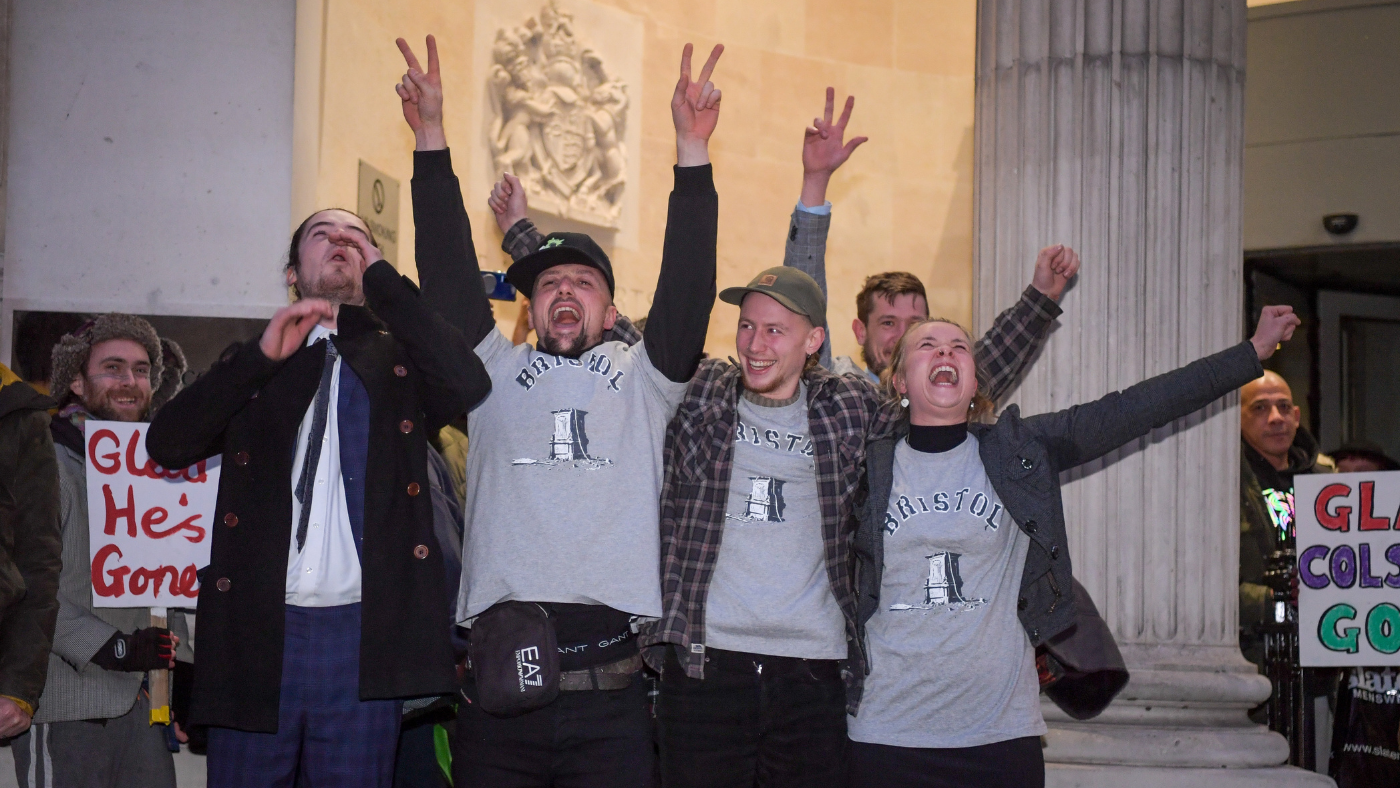
Arise, Sir Tony Blair: 14 years after leaving Downing Street, the former Labour prime minister Tony Blair is controversially knighted in the New Year Honours list.
As Moscow builds up its troop deployments near the Ukrainian border, Joe Biden warns Vladimir Putin that the US will respond “decisively” if Russia invades.
A jury acquits the defendants known as “the Colston Four” (pictured) of criminal damage, for their part in toppling a statue of the 17th century slave trader and philanthropist Edward Colston in 2020, and tipping it into the harbour in Bristol.
The Week
Escape your echo chamber. Get the facts behind the news, plus analysis from multiple perspectives.

Sign up for The Week's Free Newsletters
From our morning news briefing to a weekly Good News Newsletter, get the best of The Week delivered directly to your inbox.
From our morning news briefing to a weekly Good News Newsletter, get the best of The Week delivered directly to your inbox.
During an audience at the Vatican, the Pontiff castigates couples who “substitute cats and dogs for children”, saying “renouncing parenthood diminishes us. It takes away our humanity.”
Jonathan Van-Tam is hailed as a “national treasure” as he announces his decision to step down as England’s deputy chief medical officer. He is later knighted, but his trip to the Palace is delayed by a bout of Covid.
Owing to his refusal to be vaccinated for Covid, Novak Djokovic is deported from Australia, ending the world No. 1’s hopes of defending his Australian Open title.
After a New York judge throws out his last-ditch attempt to have Virginia Giuffre’s civil suit against him dismissed, Prince Andrew is cut adrift by the royal family, losing his military affiliations, royal patronages and HRH title.
A free daily email with the biggest news stories of the day – and the best features from TheWeek.com
The final “Plan B” restrictions in England – the mask mandate, vaccine-pass rules, working from home guidance – are all lifted. Sue Gray unveils her long-awaited report into No. 10 lockdown parties, albeit only in outline form. In the 12-page document, presented as an “update”, the senior civil servant discloses that she has looked into 16 alleged parties, and has uncovered failures of “leadership and judgement”.
“They can have Rogan or Young. Not both,” claims the Canadian rock legend Neil Young as he demands that Spotify stops hosting the popular podcasts of the comedian Joe Rogan on the grounds that they promote “fake information about vaccines”. The world’s largest music streaming service opts to remove Young’s music from the platform instead.
2. February
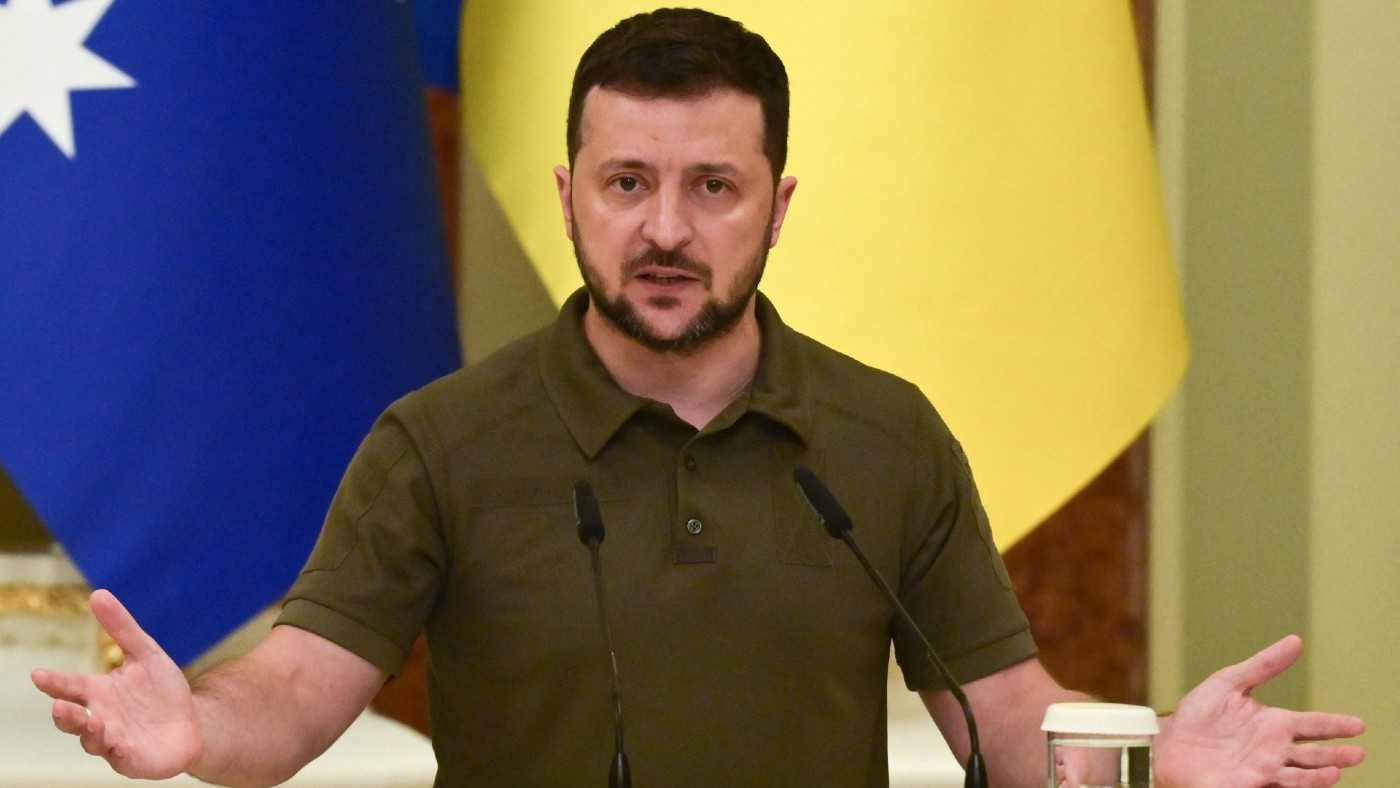
The comedian Jimmy Carr is roundly condemned for making a joke about the Holocaust: he had quipped that when people talk about the genocide, they never mention that “thousands of Gypsies” were murdered by the Nazis – because “no one wants to talk about the positives”.
As tensions increase in Ukraine, Emmanuel Macron travels to Moscow for a six-hour meeting with Vladimir Putin at which the Russian president and French president sit at opposite ends of a comically long table.
Putin later travels to Beijing for the opening of the Winter Olympics, where he hails the birth of a new “no limits” partnership with China. After the close of the Games, Moscow shocks the world by launching a full-scale invasion of Ukraine. The country’s president, Volodymyr Zelensky (pictured), rises to the challenge and rejects a US evacuation offer, saying “I need ammunition, not a ride.”
An investigation by the Independent Office for Police Conduct (IOPC) exposes a bullying and “profoundly sick” culture within the Metropolitan Police. Cressida Dick resigns as the Met commissioner after London’s Mayor, Sadiq Khan, says he is not satisfied with her plans to “root out” misogyny and racism in the force.
On social media, people puzzle over the possible meaning of the cover of Vanity Fair’s “Hollywood Issue”, which depicts a soaking wet Benedict Cumberbatch looking as though he has just emerged fully clothed from a bubble bath with a trio of swans.
Lord Ashcroft’s new book about Carrie Johnson, First Lady, accuses her – among many other things – of “impersonating” her husband by sending texts on his behalf, and of persuading him to change his mind on important decisions.
3. March
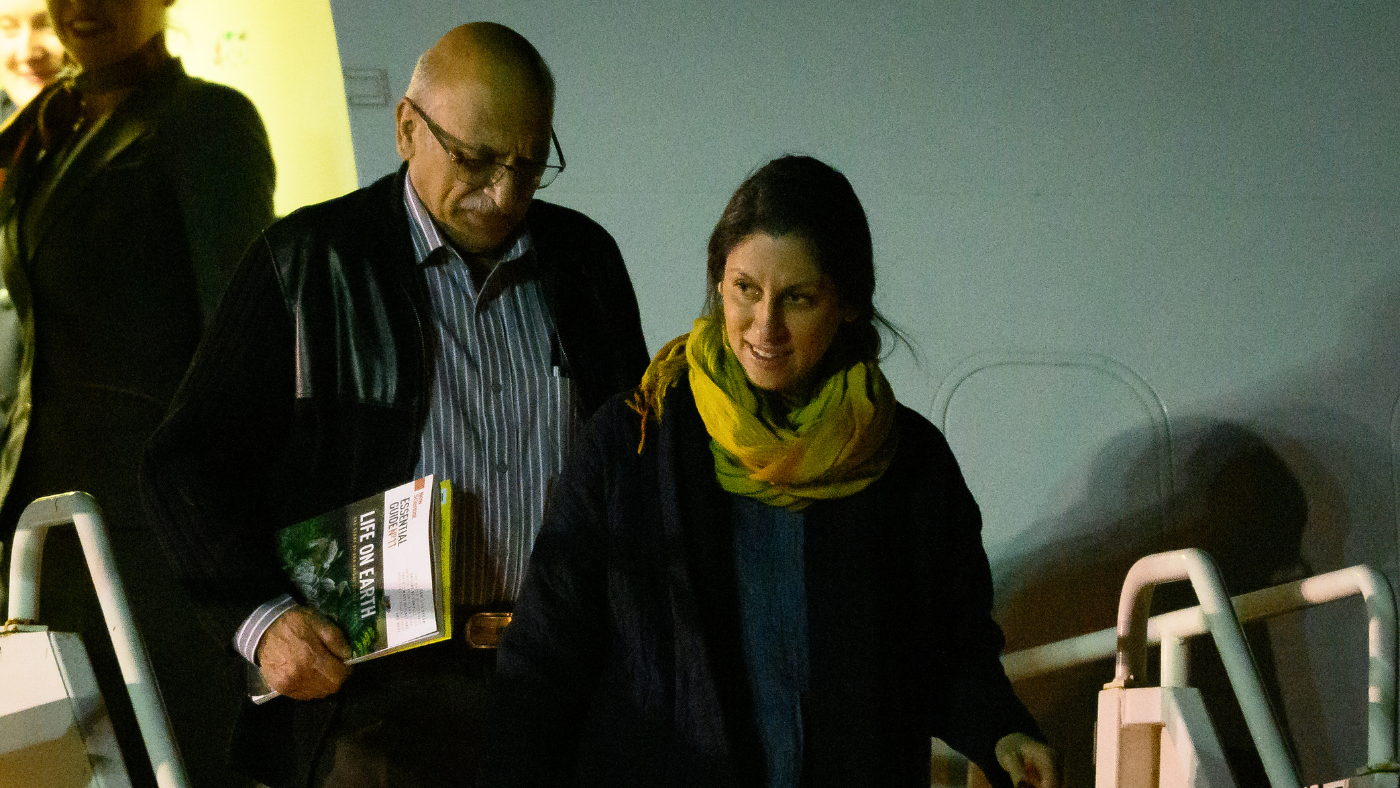
The former speaker of the House of Commons, John Bercow, is found to be a “serial bully” and liar by an independent inquiry.
More than a century after it was crushed by ice and sank off the coast of Antarctica, the wreck of Ernest Shackleton’s ship Endurance is found on the sea floor, in a remarkably good state of preservation.
Nazanin Zaghari-Ratcliffe (pictured) is released from house arrest in Tehran and allowed to fly home to Britain, six years after being detained on trumped-up charges of plotting to overthrow the Iranian government. In her first press conference, she thanks her husband Richard, raises the plight of others imprisoned in Iran, and asks why it took six years and five foreign secretaries to bring her home.
Weeks of relentless Russian bombardment reduce the Ukrainian port of Mariupol to rubble, leading its fate to be likened to that of Guernica and Dresden. Having faced widespread criticism for its “grudging” response to the Ukrainian refugee crisis, the Government finally unveils a plan to house refugees from Russia’s war. It also freezes the UK assets of wealthy and powerful Russian oligarchs, including Roman Abramovich, who subsequently sells Chelsea Football Club.
Ministers condemn the summary firing of 786 workers by P&O Ferries: the workers were told in a three-minute video message that they were losing their jobs “with immediate effect”.
Critics slam chancellor Rishi Sunak’s Spring Statement, saying it doesn’t do enough to help families facing a record hit to living standards. The negative reaction is exacerbated by Sunak’s effort to highlight the drop in fuel duty with a much-mocked photo-op at a petrol station, in which he was pictured filling a borrowed car and also struggled to use a contactless card machine to pay for a can of Coke.
Will Smith causes a sensation at the Oscars when he leaps out of his seat, marches onto the stage and slaps the presenter, comedian Chris Rock, for making a joke about his wife Jada Pinkett Smith’s hairstyle. The Academy subsequently bans Smith from attending the ceremony for ten years.
An eight-day tour of the Caribbean by the Duke and Duchess of Cambridge attracts protests and calls for slavery reparations. The PR disaster is compounded by an unfortunate photo of the couple greeting local children through a high fence. Jamaica’s prime minister, Andrew Holness, tells the royal couple that his country is “moving on” by dropping the Queen as head of state.
Gordon Ramsay sparks anger in Cornwall, where he has a second home, by informing BBC Radio 2 listeners that he loves Cornwall – “it’s just the Cornish I can’t stand”. Asked about the remark, the chef doubles down, saying: “I’m sorry. I promise I did mean it.”
4. April
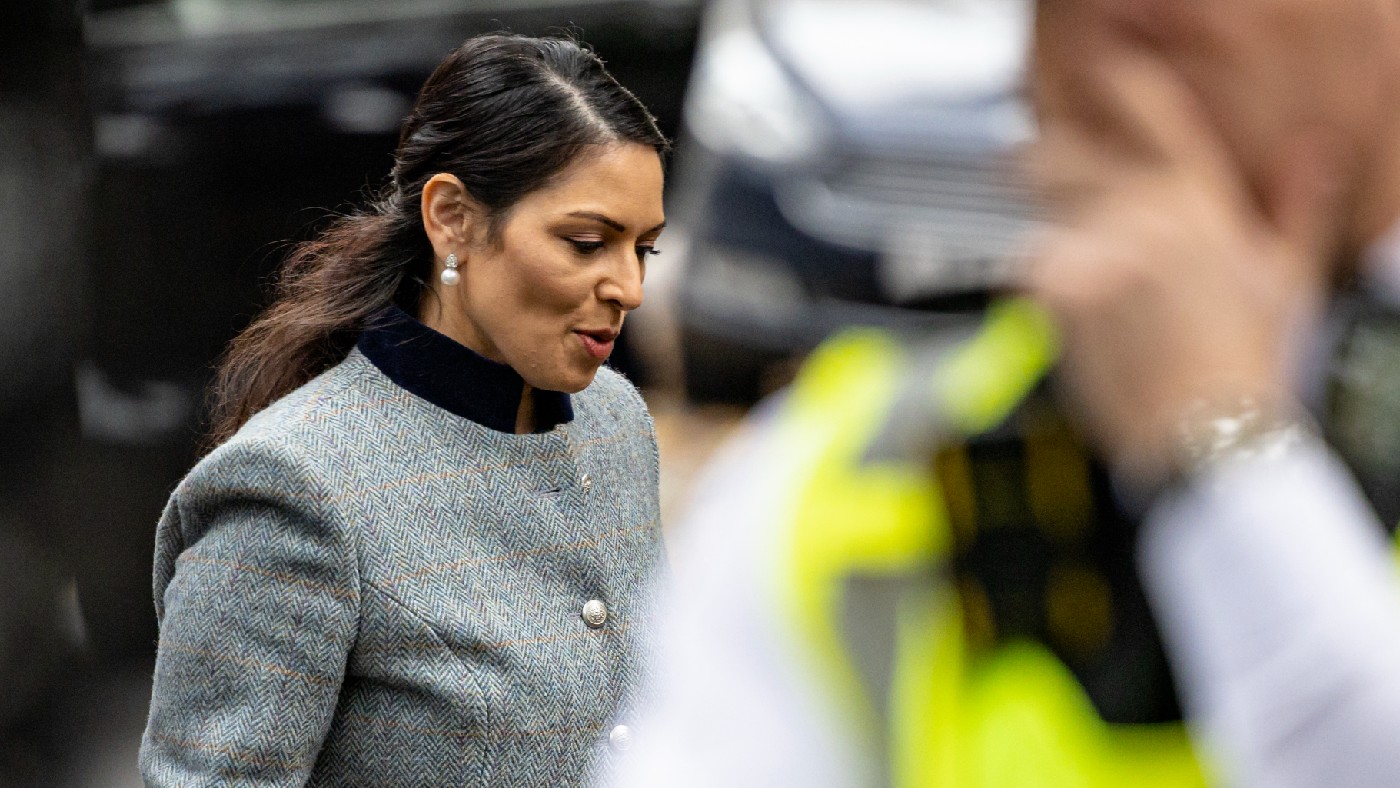
Ed Sheeran wins his lengthy legal battle over accusations that he had plagiarised another artist’s song in his megahit Shape of You.
Covid case numbers hit an all-time high in the UK, causing problems for schools and hospitals, and long delays at airports.
The prime minister, Boris Johnson, his wife, Carrie, and the chancellor, Rishi Sunak, are fined for breaking lockdown rules.
Russia begins an offensive in the Donbas region, but suffers a serious blow when its Moskva warship is sunk in the Black Sea.
The home secretary, Priti Patel (pictured), travels to Rwanda to announce a new “partnership” with the central African nation, under which asylum seekers who arrive in Britain “illegally” will be deported there. The plan is almost immediately halted by legal challenges.
Chris Mason is named as the BBC’s next political editor, replacing Laura Kuenssberg.
Emmanuel Macron becomes the first sitting French president in 20 years to be reelected when he defeats his far-right rival Marine Le Pen in a second-round run-off.
There are calls for a drastic overhaul of working practices in Westminster to address a culture of sexism and inappropriate behaviour, following the resignation of Tory MP Neil Parish, who was seen by female colleagues watching pornography on his phone in Parliament. Parish admits to having done so twice. He says that he’d initially stumbled on the content while searching for tractors.
In response to an acute national shortage of hormone replacement therapy medication, the Government appoints Madelaine McTernan as its new HRT tsar.
The bankrupt tennis star Boris Becker is sentenced to two-and-a-half years in jail after being found guilty of concealing millions of pounds of assets to avoid paying his creditors.
5. May
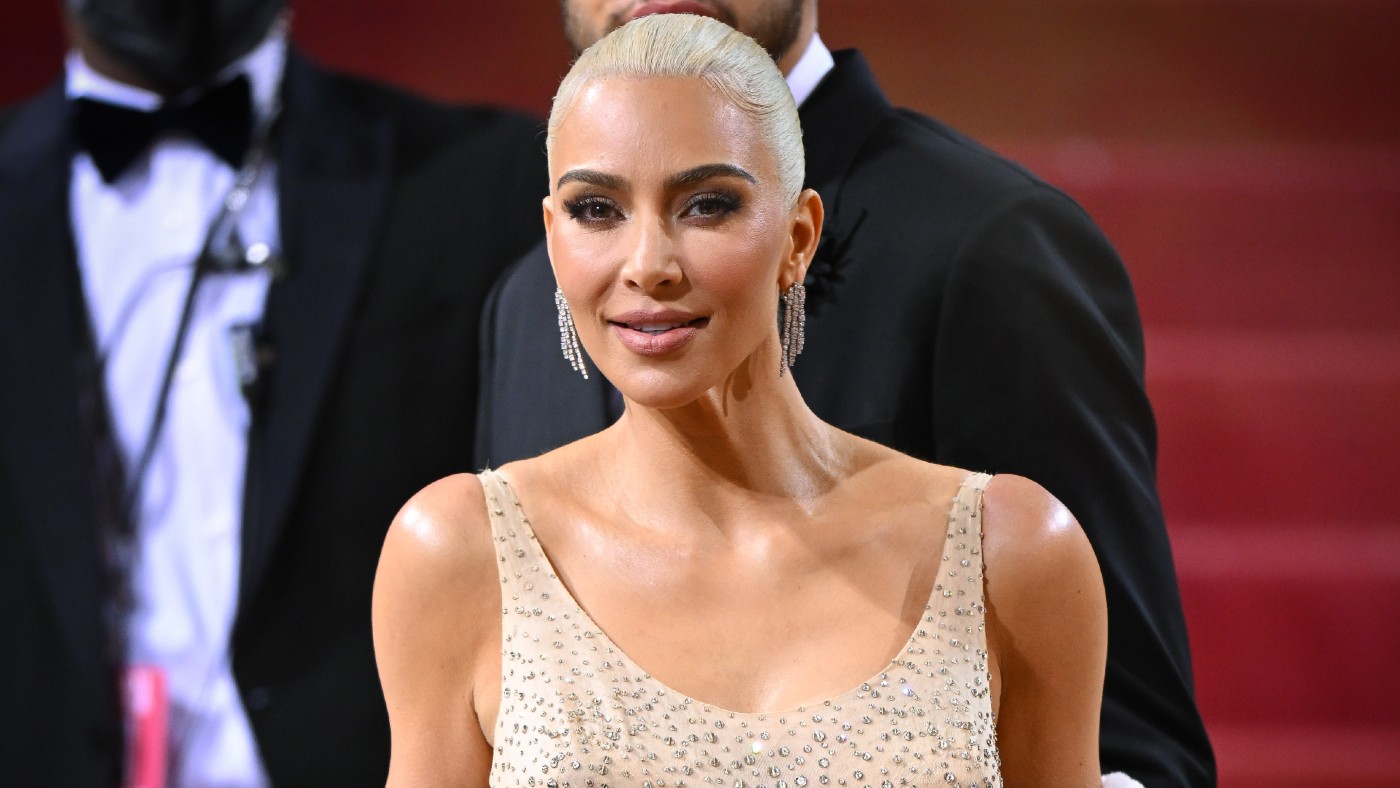
In the first address by a world leader to Ukraine’s parliament since Russia launched its invasion, Boris Johnson says Ukrainians have “exploded the myth of [Vladimir] Putin’s invincibility”.
Andrew Lloyd Webber announces the imminent closure of his new musical Cinderella, only a year after it opened in the West End. Some of the cast reveal that they’d only learnt that they were losing their jobs via social media.
Kim Kardashian (pictured) steals the show at the Met Gala by turning up in the very dress that Marilyn Monroe wore to serenade JFK on his birthday in 1962. She is subsequently accused of sending an unhealthy message about crash dieting when she reveals that she had to shed 1st 2lb in three weeks to fit into it. The franchise that owns the garment denies claims that Kardashian had damaged it.
Tories perform poorly in local elections, but draw some consolation from the news that police are investigating Labour’s Keir Starmer for alleged lockdown breaches.
In the Northern Ireland Assembly election, Sinn Féin wins the largest number of seats, putting its leader Michelle O’Neill in line to become first minister. Owing to an ongoing stalemate between Sinn Féin and its unionist counterpart, the DUP, which has left Northern Ireland without a functioning executive, O’Neill has yet to be sworn in.
Ukraine wins the Eurovision Song Contest, but the UK’s entry, Sam Ryder, comes first in the juries’ vote, and second overall.
Sue Gray’s full “Partygate” report is finally released, detailing the lockdown-breaking gatherings in Downing Street. Boris Johnson says he is “humbled” and has “learnt a lesson”, but hopes that the Government can now “move on”.
The Bank of England’s governor, Andrew Bailey, warns of “apocalyptic” food-price rises as a result of inflation triggered by Covid and the invasion of Ukraine.
6. June
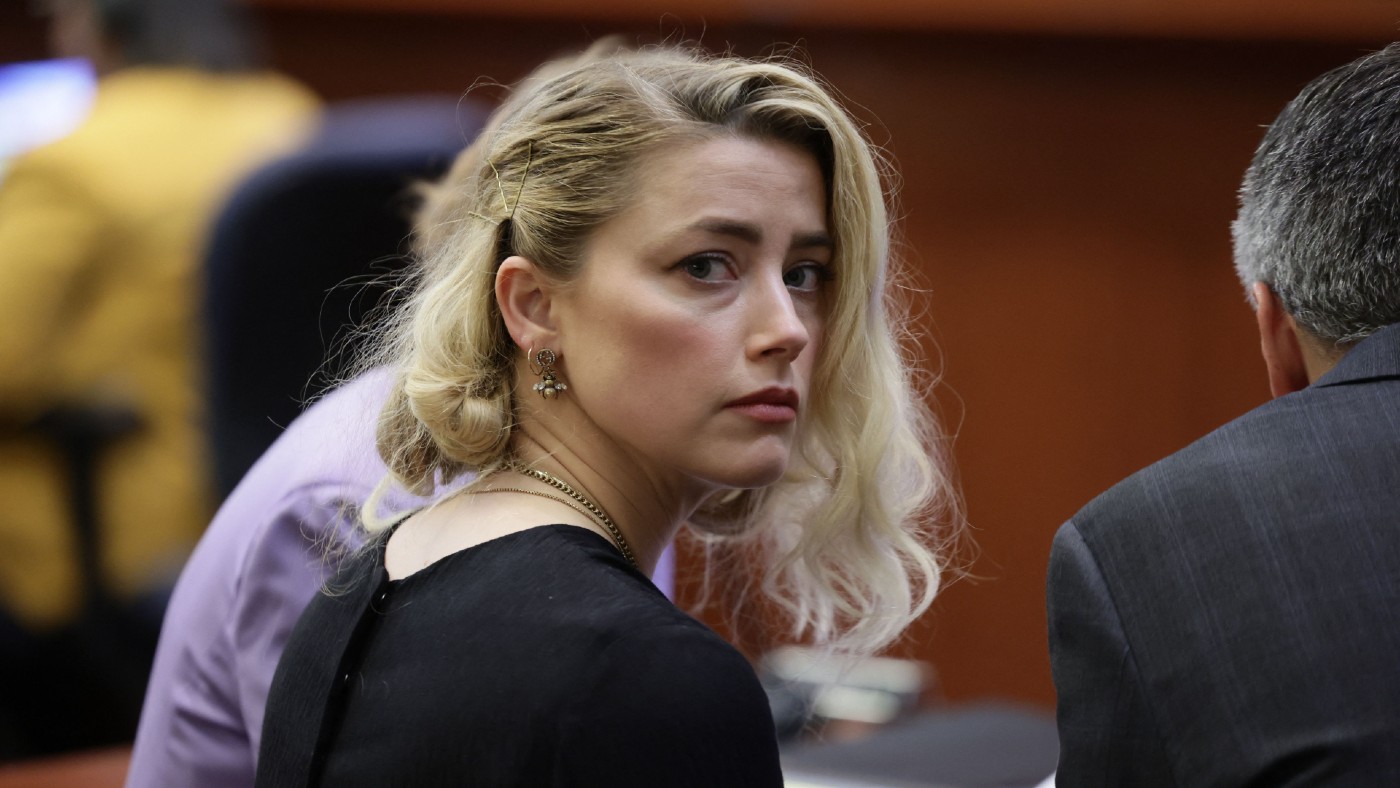
Conservative MPs vote by 211 to 148 in a confidence ballot for Johnson to remain as their party leader.
Kate Bush scores her first US top ten hit – and tops the UK charts – with her 37-year-old song Running Up That Hill, after the track is used in Netflix’s popular sci-fi drama Stranger Things.
Britain holds four days of celebrations for The Queen’s platinum jubilee. Among the highlights are a concert at Buckingham Palace and a pre-recorded video of the Queen taking tea.
The actor Johnny Depp wins his bitterly contested defamation case against his ex-wife Amber Heard (pictured), who had accused him of domestic abuse; critics condemn the verdict as a “travesty”.
New Government figures reveal that nearly 10,000 people have arrived in the UK on small boats from across the Channel since the start of the year.
Keir Starmer urges his shadow cabinet to stop briefing the press that he’s boring, warning them: “What’s boring is being in opposition.”
A Google engineer causes a stir by claiming that one of the company’s software programs has achieved “sentience”. To prove his point, Blake Lemoine publishes a series of exchanges he had with the chatbot in which, among other things, it expressed fears about being switched off. Sceptics are unpersuaded.
After a three-year hiatus, the Glastonbury festival makes a triumphant return, with Paul McCartney in the headline slot.
It is reported that Rupert Murdoch and Jerry Hall are to divorce after six years of marriage.
7. July
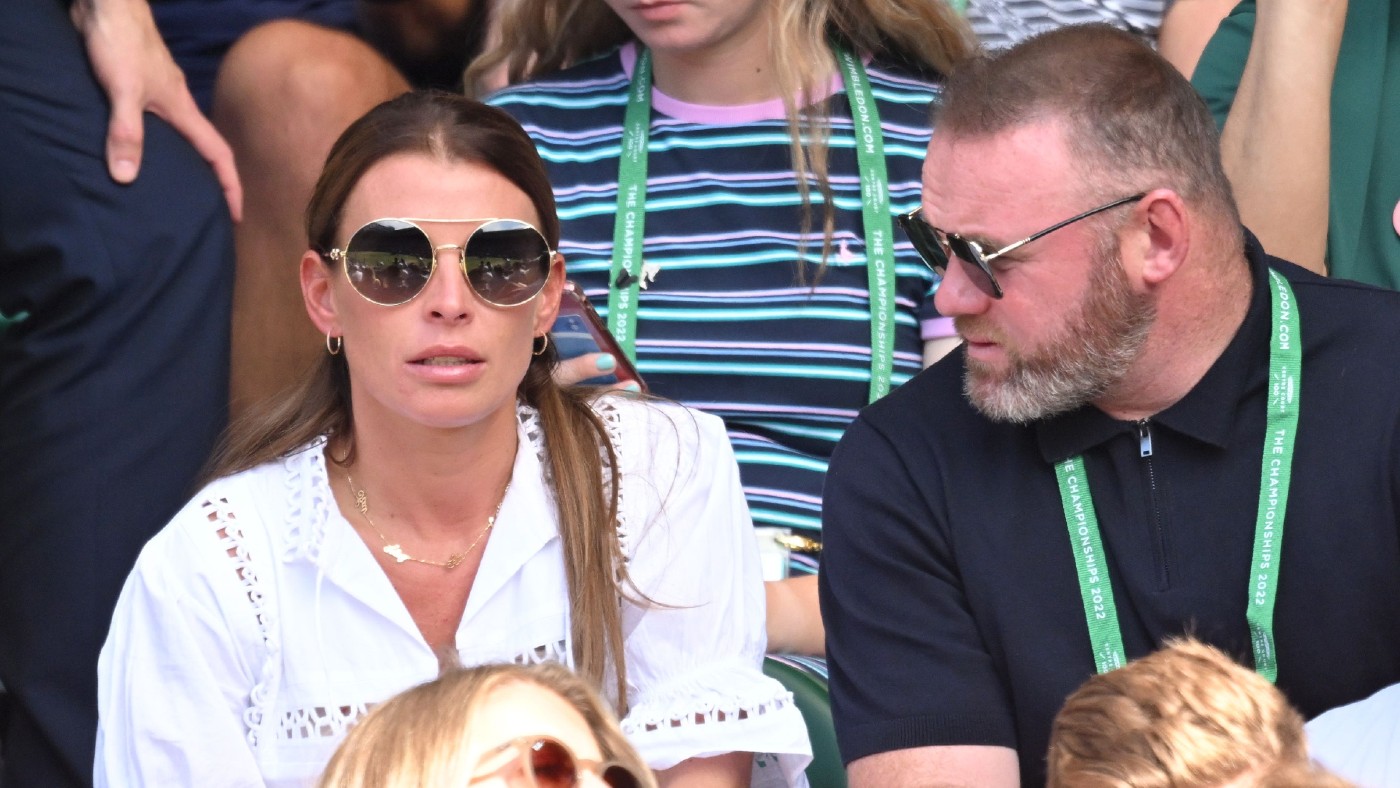
The chancellor, Rishi Sunak, and the health secretary, Sajid Javid, quit, triggering an avalanche of more than 50 ministerial resignations that brings down Boris Johnson. “Them’s the breaks,” concedes the PM in a grudging farewell address.
Mo Farah is inundated with messages of support after revealing that he was a victim of modern child slavery. The Olympic champion had always claimed that he’d arrived as a refugee with his parents; in fact, he was trafficked to the UK aged nine.
Mark Rowley is named as the new commissioner of the Metropolitan Police, replacing Cressida Dick.
Japan reels in response to the shock assassination of its former prime minister, Shinzo Abe.
Keir Starmer is exonerated over “Beergate”, when Durham police declare that neither he nor his deputy, Angela Rayner, had broken the law by eating a curry with party activists in April 2021.
For the first time on record, temperatures top 40°C in the UK.
Hollywood stars Jennifer Lopez and Ben Affleck tie the knot in Las Vegas, nearly 20 years after breaking off their first engagement.
The WHO declares a global emergency over an outbreak of monkeypox.
A judge rules against Rebekah Vardy in the notorious “Wagatha Christie” libel case against Coleen Rooney, leaving Vardy with an estimated £2m legal bill, and her reputation in shreds.
8. August
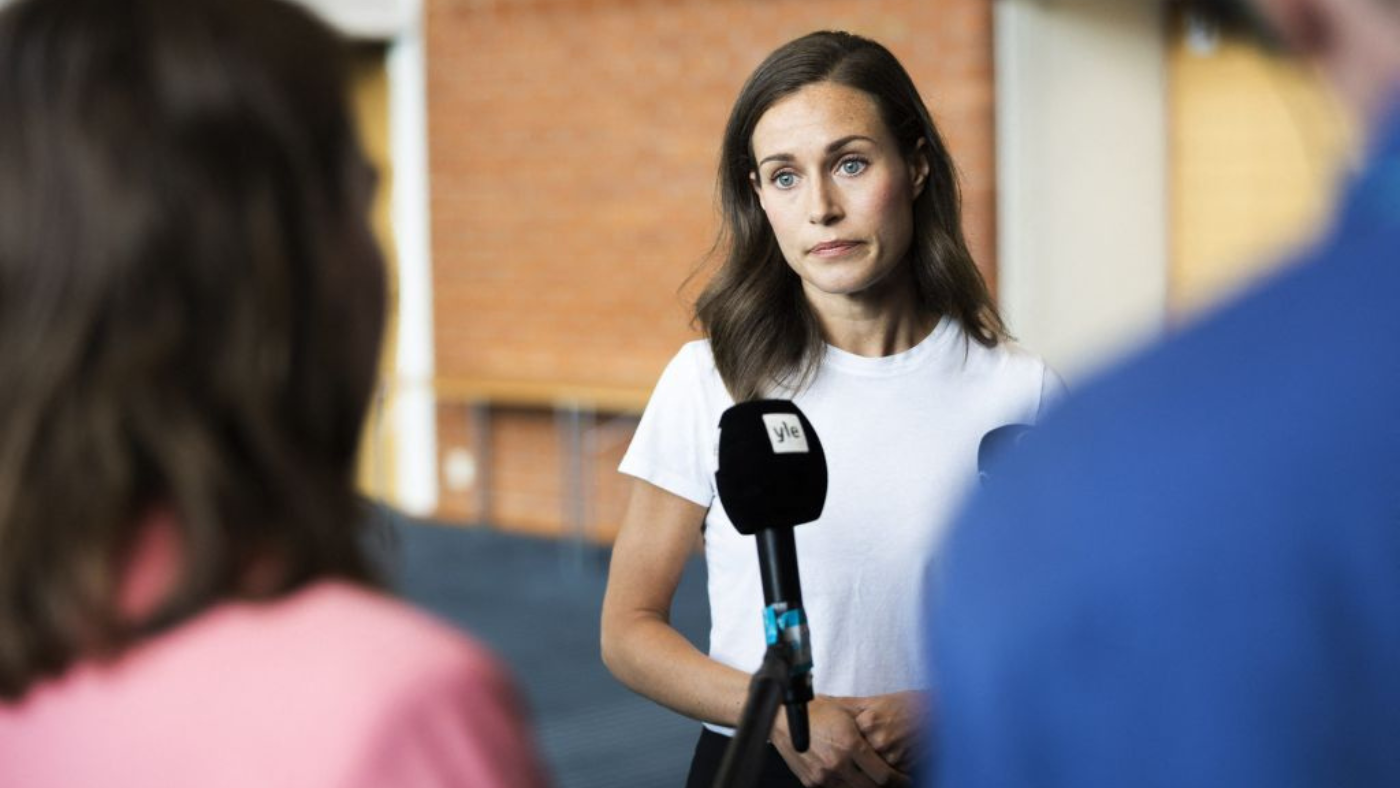
Jubilant football fans gather in Trafalgar Square to celebrate the victory of the England women’s team in the Euro 2022 final. The match, watched by a TV audience of 17.4 million, saw the Lionesses win 2-1 in a packed Wembley Stadium.
The parents of Archie Battersbee lose their legal battle to prevent his life-support machine being turned off after the courts accept that he has suffered “irreversible brain stem damage”. The 12-year-old had been found unconscious with a ligature around his neck: his mother believes he had been taking part in a TikTok “blackout” challenge that went horribly wrong.
Alex Jones, the US far-right radio host who claimed the Sandy Hook school massacre was a hoax, loses the first of three defamation cases brought by bereaved parents. As the damages mount up to $1.5bn, he later files for bankruptcy.
Salman Rushdie is stabbed while taking part in a literary event in upstate New York. The assault leaves the 75-year-old author of The Satanic Verses blind in one eye and unable to use a hand.
News of hosepipe bans and leaks, and multiple reports about the large-scale dumping of sewage into watercourses and the sea, prompts fresh outrage at the pay packets of water company executives.
Finland’s prime minister comes in for criticism after leaked footage shows her dancing and drinking during a raucous night out with friends, at which apparent references to drugs are made. The 36-year-old Sanna Marin (pictured) insists that she’s entitled to some downtime and takes a drug test to prove she hadn’t taken any illegal substances. Women in Finland and elsewhere show their solidarity by posting videos of themselves dancing.
The former party animal Kate Moss, meanwhile, launches her very own health and wellness brand, Cosmoss, selling products “for balance and rejuvenation”.
A strike by refuse workers leads to overflowing, festering bins at the Edinburgh Festival, putting pressure on Nicola Sturgeon.
Liverpool reacts with shock and anger when a nine-year-old girl is shot dead in her own home – 15 years to the day after 11-year-old Rhys Jones was shot as he walked home from football practice. Olivia Pratt-Korbel was killed when a masked gunman ran into her house, firing indiscriminately, in pursuit of a gang member who had forced his way in.
9. September
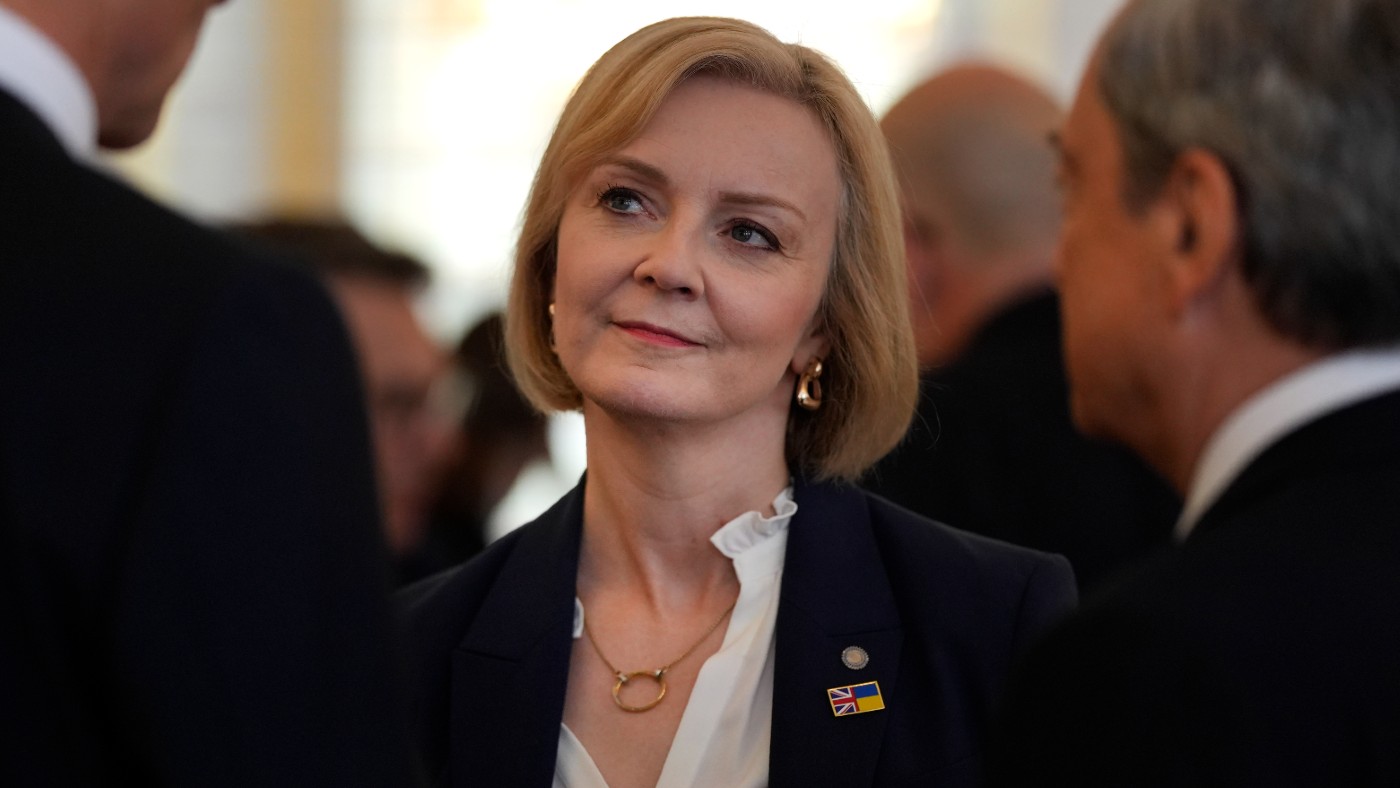
Liz Truss (pictured) wins the protracted Tory leadership contest. In her acceptance speech, she promises to “deliver, deliver, deliver”. The pound tumbles in response to the chancellor, Kwasi Kwarteng’s, subsequent mini-Budget.
A summer of unprecedented rainfall leaves a third of Pakistan underwater, inundating the homes of 33 million people.
“She who stood with the giants of the 20th century on the path of history has now left to join them,” says France’s President Macron as he joins other world leaders in paying tribute to the late Queen Elizabeth II. People queue for hours to attend her lying in state, and hundreds of thousands line the streets of London and Windsor for her funeral.
A month after Serena Williams announces that she is “evolving away from tennis”, her fellow champion Roger Federer announces that he, too, is retiring from the circuit.
A series of clashes, mainly between youths from Leicester’s Hindu and Muslim communities, sparks alarm about sectarian tensions in the city.
Italy elects its most right-wing government since the Second World War, paving the way for Giorgia Meloni, leader of the hardline Brothers of Italy, to become Italy’s first female prime minister.
The death in detention of Mahsa Amini, a 22-year-old student arrested in Tehran for “inappropriate attire”, triggers months of protests across Iran.
Amid continuing setbacks on the battlefield in Ukraine, Vladimir Putin announces a “partial mobilisation” of his countrymen, along with the formal annexation of Kherson, Zaporizhzhya, Donetsk and Luhansk.
The world of chess is plunged into turmoil by cheating allegations, after Hans Niemann, a 19-year-old American, beats the Norwegian world champion Magnus Carlsen, ending his 53-game unbeaten streak.
10. October
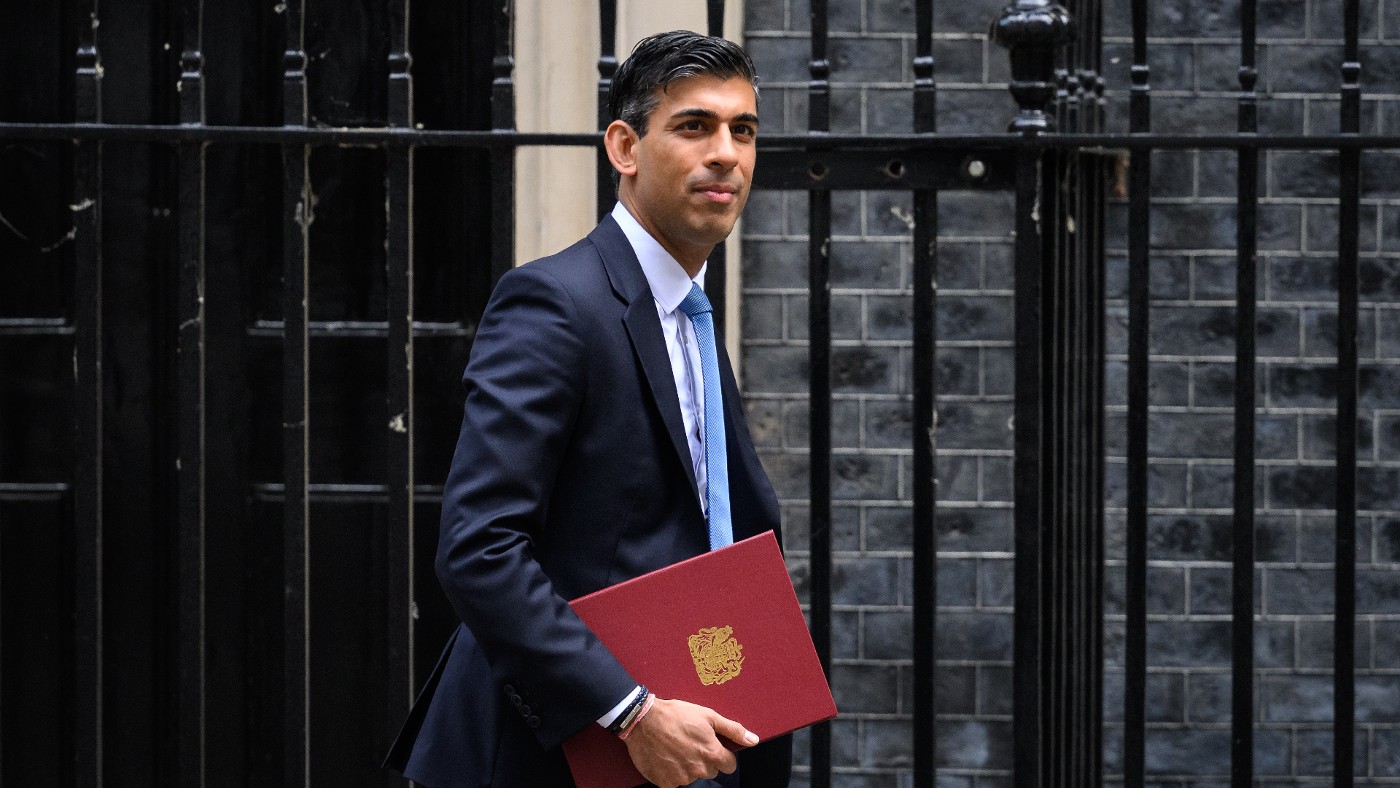
As the PM’s economic agenda unravels, chancellor Kwasi Kwarteng is summoned back early from an International Monetary Fund conference in Washington and fired.
The Daily Star livestreams a lettuce to determine whether it or Liz Truss has a longer shelf life; the lettuce wins.
Rishi Sunak (pictured) fends off an attempted comeback by Boris Johnson to win the Tory leadership and become Britain’s first Asian prime minister – and, at the age of 42, its youngest leader since Napoleonic times.
In the latest stunt by members of the Just Stop Oil protest group, two climate activists throw cans of soup over van Gogh’s Sunflowers before glueing their hands to the wall of the National Gallery.
A nationwide “prevention zone” is introduced in Britain to tackle the country’s largest ever recorded outbreak of avian flu.
The Chinese Communist Party Congress underlines the supremacy of President Xi Jinping. The abiding image of the gathering is of Xi’s predecessor Hu Jintao, for reasons unknown, being firmly escorted from the closing ceremony.
Dame Judi Dench writes a blistering letter to The Times, complaining that the latest series of Netflix’s royal drama The Crown is “cruelly unjust” to Charles and Diana. “The closer the drama comes to our present times,” she says, “the more freely it seems willing to blur the lines between historical accuracy and crude sensationalism.”
Brazil’s former president, Luiz Inácio Lula da Silva, completes a remarkable political comeback by beating the incumbent, Jair Bolsonaro, in the country’s presidential election.
After trying for months to wriggle out of the deal, Elon Musk finally buys Twitter, for roughly $44bn.
The billionaire rapper Kanye West (now Ye) sabotages his own business empire with a series of antisemitic rants.
11. November
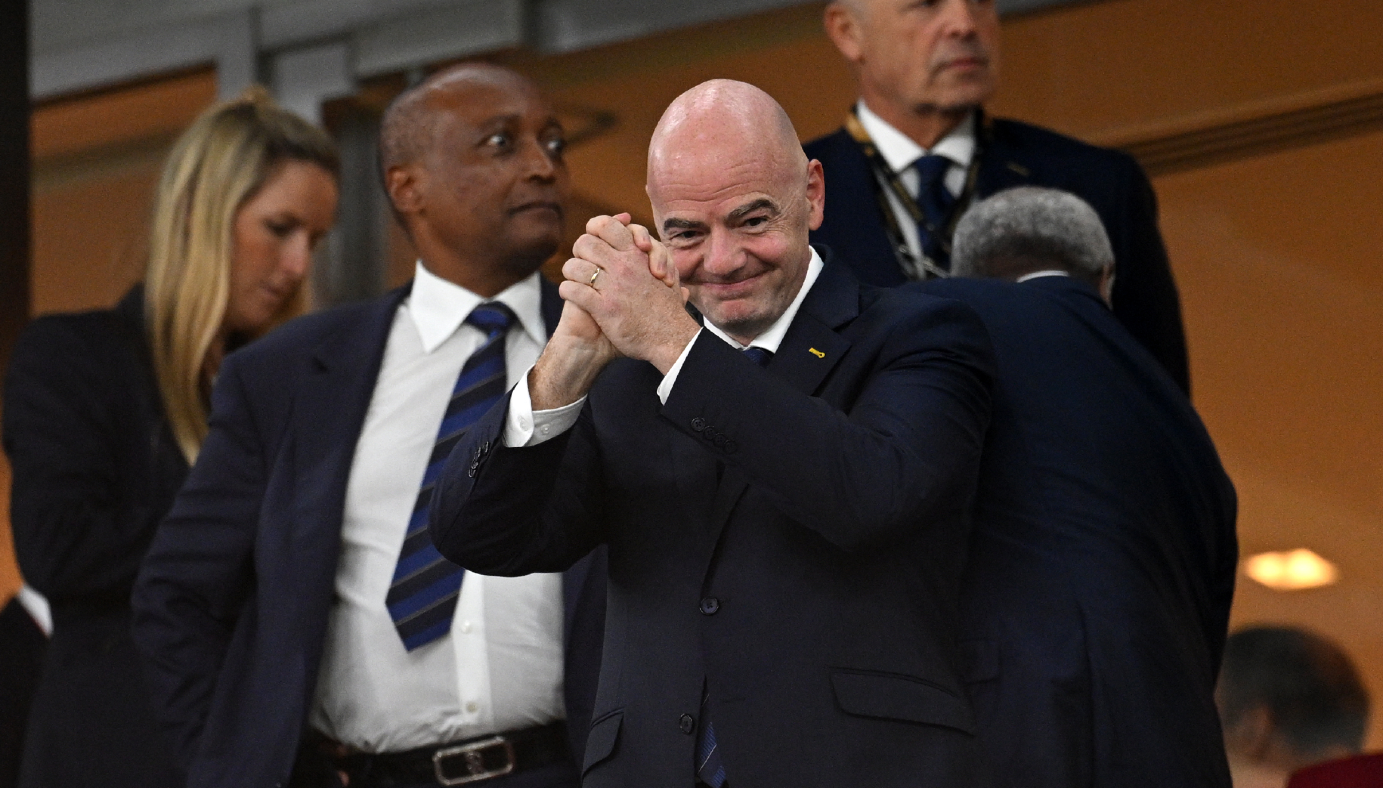
Russian forces withdraw from Kherson, the only Ukrainian provincial capital that they had occupied.
Taylor Swift becomes the first artist in history to claim all ten spots in the US singles chart.
Matt Hancock is stripped of the Tory whip for travelling to Australia to take part in I’m a Celebrity... Get Me Out of Here!. The former health secretary defends his appearance on the reality show, saying that politicians need to “leave their ivory towers” and “go to where the people are”. After finishing third, Hancock announces his intention to stand down at the next election.
In the wake of the Republicans’ poor showing in the midterm elections, Donald Trump confirms that he will seek to win back the White House in the 2024 presidential election.
The UN’s Cop27 summit in Sharm el-Sheikh ends with an 11th-hour agreement by richer countries to give financial aid to developing nations suffering disproportionately from the impact of climate change.
Gavin Williamson suffers his third Cabinet sacking – this time over multiple complaints of bullying.
The UK Supreme Court rules that the Scottish Government does not have legal authority to hold an independence referendum without agreement from Westminster, dealing a blow to First Minister Nicola Sturgeon’s plans to stage a vote next year.
The World Cup gets under way in Qatar amid criticism of the host nation’s human rights record. Fifa president Gianni Infantino (pictured) fails to defuse the row with a bizarre, hour-long speech in which he declares: “Today I feel Qatari. Today I feel Arab. Today I feel African. Today I feel gay. Today I feel [like] a migrant worker.”
Protesters in China take to the streets to demand the lifting of the country’s relentless pandemic controls, an end to censorship and the removal of President Xi.
Amazon founder Jeff Bezos confirms that he plans to give away the majority of his £110bn fortune during his lifetime.
Media reports allege that Tory peer Michelle Mone profited from a £200m Government contract that she helped secure for a medical supply business. She later announces that she will take a “leave of absence” from the House of Lords to “clear her name” over the allegations that have been “unfairly levelled against her”.
12. December

Sam Bankman-Fried, the disgraced former boss of the bankrupt cryptocurrency exchange FTX, is arrested in the Bahamas at the request of the US government.
The boss of the RMT union, Mick Lynch, becomes the public face of a new wave of industrial action in Britain.
Keir Starmer vows to carry out the “biggest ever transfer of power from Westminster to the British people”, as he unveils a new report into sweeping constitutional reforms. He also causes a stir by reaffirming his party’s commitment to remove charitable status from private schools, and require them to charge VAT on their fees.
At a Buckingham Palace reception, 83-year-old royal courtier Lady Susan Hussey repeatedly asks one of the guests, Ngozi Fulani, head of the domestic violence charity Sistah Space, where she is “really from”. Fulani goes public about the racially insensitive exchange, and Hussey resigns from the royal household.
The Sussexes (pictured) attract fresh controversy when a confessional, six-part series about them is released on Netflix.
England’s footballers return home from Qatar, after their World Cup campaign ends in a narrow 2-1 defeat to France at the quarter-final stage.
Time magazine names Volodymyr Zelensky as its “Person of the Year”, awarding him the accolade “for proving that courage can be as contagious as fear”.
-
 Switzerland could vote to cap its population
Switzerland could vote to cap its populationUnder the Radar Swiss People’s Party proposes referendum on radical anti-immigration measure to limit residents to 10 million
-
 Political cartoons for February 15
Political cartoons for February 15Cartoons Sunday's political cartoons include political ventriloquism, Europe in the middle, and more
-
 The broken water companies failing England and Wales
The broken water companies failing England and WalesExplainer With rising bills, deteriorating river health and a lack of investment, regulators face an uphill battle to stabilise the industry
-
 How corrupt is the UK?
How corrupt is the UK?The Explainer Decline in standards ‘risks becoming a defining feature of our political culture’ as Britain falls to lowest ever score on global index
-
 Democrats push for ICE accountability
Democrats push for ICE accountabilityFeature U.S. citizens shot and violently detained by immigration agents testify at Capitol Hill hearing
-
 Fulton County: A dress rehearsal for election theft?
Fulton County: A dress rehearsal for election theft?Feature Director of National Intelligence Tulsi Gabbard is Trump's de facto ‘voter fraud’ czar
-
 ‘Melania’: A film about nothing
‘Melania’: A film about nothingFeature Not telling all
-
 Greenland: The lasting damage of Trump’s tantrum
Greenland: The lasting damage of Trump’s tantrumFeature His desire for Greenland has seemingly faded away
-
 Minneapolis: The power of a boy’s photo
Minneapolis: The power of a boy’s photoFeature An image of Liam Conejo Ramos being detained lit up social media
-
 The price of forgiveness
The price of forgivenessFeature Trump’s unprecedented use of pardons has turned clemency into a big business.
-
 Reforming the House of Lords
Reforming the House of LordsThe Explainer Keir Starmer’s government regards reform of the House of Lords as ‘long overdue and essential’